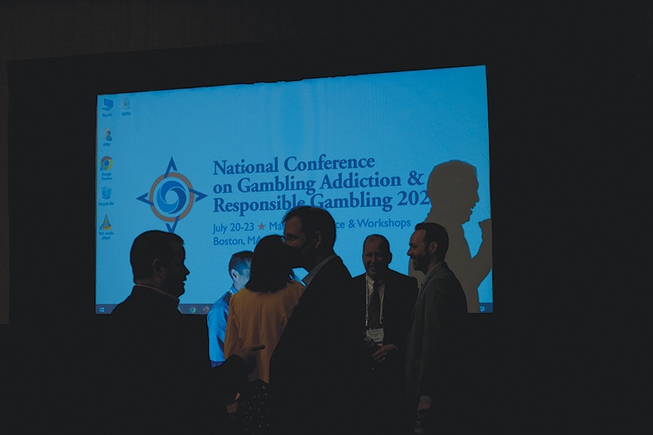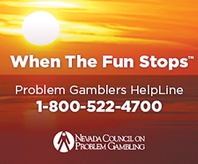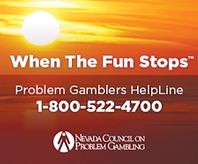
Amir Hamja / The New York Times File (2022)
Attendees talk during a break at the 2022 National Conference on Gambling Addiction & Responsible Gambling in Boston. March is Problem Gambling Awareness Month.
Friday, March 24, 2023 | 2 a.m.
Mental health in Nevada
Problem gambling can be considered an “invisible disease” because of its potential to go unnoticed for long periods of time — during which its impact only grows deeper and more dangerous, said Alan Feldman, distinguished fellow in responsible gaming at UNLV’s International Gaming Institute.
The ease with which problem gambling can remain in the dark is even more reason to shed light on it over the course of Problem Gambling Awareness Month this March, Feldman said.
“If the people around the gamblers — the people who are closest to them — on a daily basis are unable to pick up the signs, then the problem is going to continue and worsen,” Feldman said. “If, on the other hand, they’re able to pick up on the signs, there are a number of better possible outcomes.”
At least 400 to 500 Nevadans take advantage of state-funded programs to treat problem gambling each year, according to Ted Hartwell, community engagement liaison at the Nevada Council on Problem Gambling. More than 100 Gamblers Anonymous meetings take place in the Las Vegas area each week, he added.
The Nevada Council on Problem Gambling, which is one of 35 state affiliates of the national organization, works year-round to generate awareness, promote education and advocate for quality treatment of problem gambling among Nevadans, Hartwell said.
Someone who is a problem gambler has “trouble controlling their gambling and will continue even when it causes significant problems,” according to the American Psychiatric Association. The group says signs of addiction include: lying to hide gambling activity; after losing money gambling, often returning to get even; repeated unsuccessful efforts to control, cut back on or stop gambling; and gambling when feeling distressed.
“We take no position for or against gambling, we just recognize that — for a small percentage of people — it does become a true addiction just like substances can become an addiction,” Hartwell said. “Then, we want to be a resource for those individuals and/or their family members who are struggling.”
Nevada’s most recent prevalence study on problem gambling, which Hartwell noted was conducted more than 20 years ago, suggested that up to 6% of Nevada adults struggle with problem gambling. And many are struggling in silence, he said.
“There’s a lot of stigma with this illness — a lot of guilt and shame,” Hartwell said. “A lot of people don’t realize it’s even a real thing. They don’t know that there’s help out there.”
Though the council doesn’t provide problem gambling treatment itself, Hartwell said, it does refer people to possible treatment options and provide them with resources to identify if they or a loved one is suffering from problem gambling.
The state’s Gambling Treatment Diversion Court also helps individuals suffering from problem gambling and their families by guiding them through a regimented treatment program with court oversight, Feldman said.
Additionally, research funding for problem gambling in Nevada goes to a relatively one-of-a-kind program that looks at treatment outcomes for the disorder, Feldman said.
“Not everyone who experiences harm from gambling necessarily needs treatment, or for that matter, even wants treatment,” he said. “Treatment, however — for those who seek it out — is unbelievably effective.”
Some signs of problem gambling, like financial loss, are more obvious than others, Hartwell said. Many people struggling with problem gambling are doing so to escape physical or emotional trauma, he said.
He pointed to an increase in gambling during the COVID-19 pandemic, noting that the record gambling revenue Las Vegas has seen month over month in the past two years started long before the state saw a resurgence in visitation — which may suggest that Nevadans are spending more on gambling than ever.
“Some percentage of those obviously are probably doing it in an unhealthy way, as opposed to just for entertainment, which is what you should use gambling for and what most people do use gambling for,” Hartwell said.
Because Las Vegas is a top destination for gambling in the U.S., Hartwell said it was helpful for the council to have the support of entertainment properties like MGM Resorts International or Caesars Entertainment to encourage responsible gaming.
Many casinos on the Las Vegas Strip go above and beyond state regulations in regard to responsible gaming, he said.
“As the largest gaming company in North America, we have a special responsibility to our guests and the communities in which we operate,” Sean McBurney, regional president of Caesars Entertainment, wrote in an email to the Sun. “It’s our goal to make sure that players who game with us do so responsibly.”
Earlier this month, Caesars announced two new responsible gaming initiatives, McBurney said, including a universal exclusion policy that will allow in-person and online players to self-exclude from all Caesars platforms.
Additionally, a 21-plus gaming policy will restrict access to the Caesars Rewards database for customers in jurisdictions where users under the age of 21 are allowed to use their products and will limit all domestic gaming, pari-mutuel, sports and iGaming options to individuals over the age of 21.
“We all have our roles to play in fighting problem gambling — and that includes gaming providers, regulators, research and treatment professionals, and nonprofit advocacy groups,” McBurney said. “At Caesars, we want to make sure that everyone plays with us for the right reasons — to simply have fun.”
People struggling with problem gambling aren’t limited to casino patrons, either, Hartwell said. Employees in the gaming industry generally suffer from problem gambling at a higher rate than the general population, he said.
“So, in order to be good social actors, not only for their patrons, but for their own team members, (casinos) have a vested interest in, of course, keeping people playing at a healthy level and — if they’re not — connecting them to help,” Hartwell said.
Problem gambling — or gambling disorder — is classified as a behavioral addiction, on par with a substance-use disorder like alcoholism or drug abuse, Feldman said. Unlike many cases of substance-use disorders, however, a gambling disorder can be tough to diagnose.
“There’s a reason we call this the hidden addiction,” Hartwell said. “So, unlike the substance-use disorders, gambling can often be hidden for years or even decades, especially if the person who’s in control of the finances in the household or the business is the one with the problem.”

